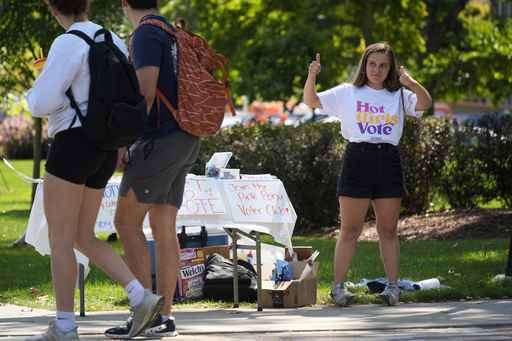
PITTSBURGH — As freshmen at the University of Pittsburgh began their collegiate journey, lively sounds of Taylor Swift and Chappell Roan filled the atmosphere, blending with the sight of lanternflies buzzing around. A folding table, covered with an iridescent pink tablecloth, displayed an array of snacks and colorful butterfly hairclips, alongside pink stickers emblazoned with slogans such as “Saving Democracy is Hot” and “Hot Peeps Vote.” The event’s organizers sported shirts that proclaimed, “Hot Girls Vote.”
This vibrant voter registration initiative was led by NextGen America, a progressive group determined to boost engagement among young women in crucial swing states like Pennsylvania. Meredith Wenthur, an 18-year-old freshman who moved from North Carolina, stopped by to sign up and expressed her intention to vote for Democrat Kamala Harris. She enthusiastically recounted her admiration for the vice president’s debate performance against Republican candidate Donald Trump, praising the way she confidently asserted her views.
Young women have historically leaned Democratic, and this election cycle could witness a significant gender gap, especially as Harris vies to become the first female president while abortion rights remain a contentious topic. Wenthur reflected this sentiment, stating firmly, “Men shouldn’t have a say in what women can and can’t do with their bodies.”
In Allegheny County, which has consistently backed Democratic presidential candidates in the last five elections, the turnout of young women voters is essential for shaping the outcome in one of the largest battleground states. As of October 21, over 88,670 voters aged 18 to 24 and more than 183,232 voters aged 25 to 34 have been registered in the county, making up nearly 30% of the total voting population of over 943,221 registered voters. Among them are 522,536 registered Democrats and 270,952 registered Republicans.
Mobilizing this traditionally Democratic demographic will be vital for Harris, especially as surrounding rural, Republican-leaning areas could swing the vote in favor of Trump. Trump has been vocal about his desire to rally young men, often emphasizing traditional masculine roles in his campaign narrative, where he positions himself as a guardian for women’s wellbeing. “They will finally be healthy, hopeful, safe and secure,” he claims, advocating for a vision where women’s lives are fulfilling and secure.
Conversely, Harris has criticized Republican stances, asserting, “It’s clear that they just don’t trust women. Well, we trust women.” Jessica Herrera, senior director at Supermajority, a group dedicated to empowering young women, highlighted that abortion is a significant issue, symbolizing women’s autonomy. “When candidates and politicians talk about abortion, it isn’t the procedure itself; it’s the power that we have to make decisions about our own lives,” she noted.
Research from Supermajority focuses on young women who infrequently vote, and Herrera believes that if there’s an uptick in voting this year, it is likely to be driven by younger women. “They have come around in a way that I think is surprising,” Herrera claimed. On the other hand, Democratic pollster Celinda Lake remarked that Trump’s message may alienate women, stating, “Women want to be empowered. Women want to have freedom. Women want to have control.”
In contrast, Trump’s national press secretary, Karoline Leavitt, argued that while Harris may aim to become the first woman president, her policies have been harmful to women, claiming they’ve left many worse off.
In Pennsylvania, the stakes are exceptionally high. Allegheny County, with a population of around 1.25 million, forms a blue stronghold amid a sea of red in neighboring areas. President Biden won the state by a narrow margin in the last election, and Harris is expected to focus heavily on this pivotal state. Both candidates have made significant campaign stops, with Pennsylvania seeing more visits than any other state.
Political experts, such as Professor Chris Borick from Muhlenberg College, believe that enthusiasm among young women for Harris could be critical in swaying voters. “This is one of those places where you could see something really different,” he suggested. However, some young women remain undecided, including 18-year-old freshman Teba Latef, who expressed a lack of confidence in both candidates. “They take advantage of different kinds of people,” she remarked, conveying her skepticism about the sincerity of their platforms. “Harris is manipulating women concerned about their reproductive rights, knowing that realistically, bringing back a nationwide right to abortion is nearly impossible.”
